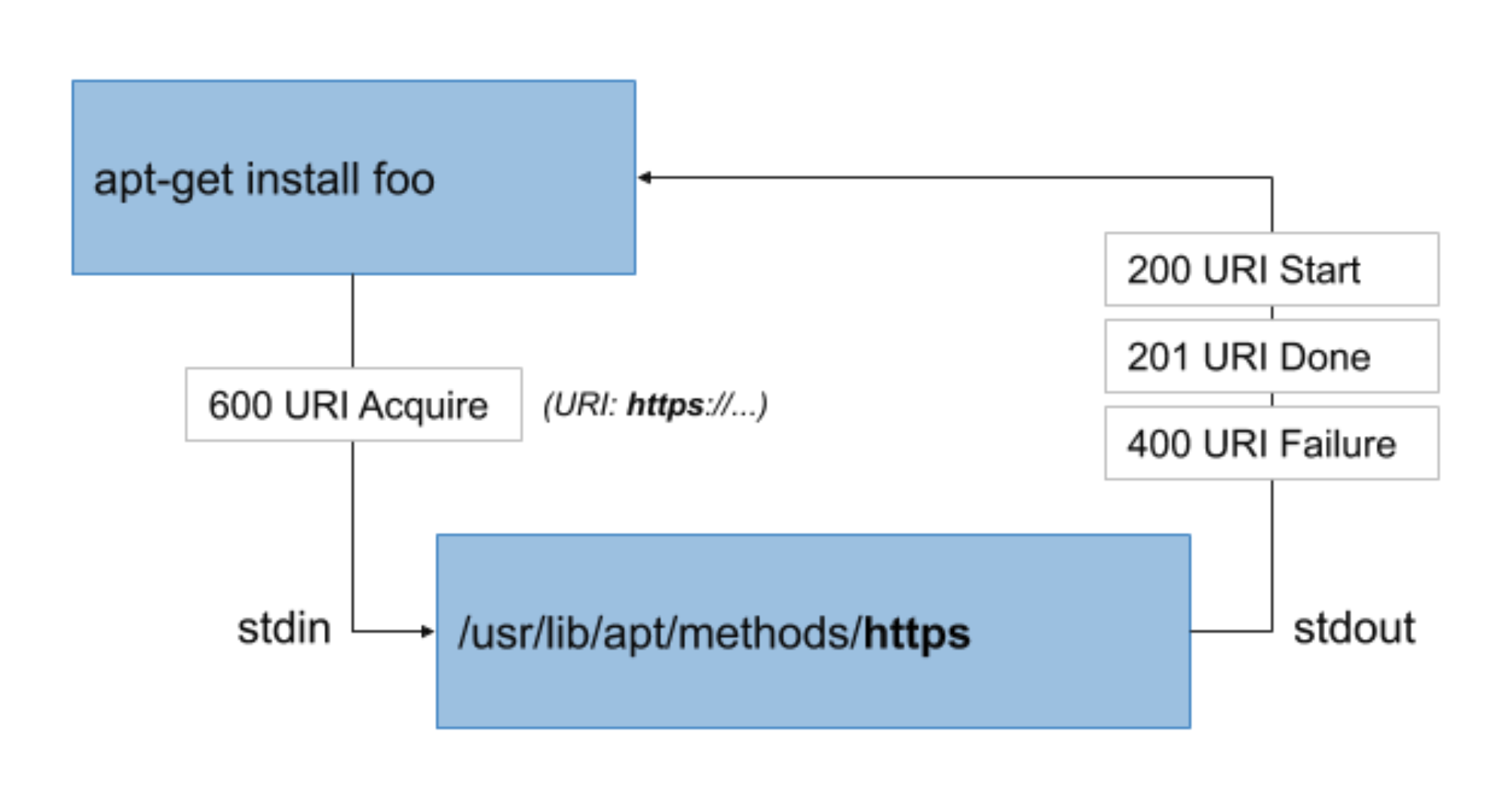Cato Networks Steers SD-WAN Management Away From Telcos
The company explained that its platform provides enterprise customers with greater flexibility by...
5G Opens Big Windows for Cisco, Juniper, and VMware
A confluence of transformational shifts in mobile networks is fostering a more favorable...
A Tale of Two (APT) Transports

Securing access to your APT repositories is critical. At Cloudflare, like in most organizations, we used a legacy VPN to lock down who could reach our internal software repositories. However, a network perimeter model lacks a number of features that we consider critical to a team’s security.
As a company, we’ve been moving our internal infrastructure to our own zero-trust platform, Cloudflare Access. Access added SaaS-like convenience to the on-premise tools we managed. We started with web applications and then moved resources we need to reach over SSH behind the Access gateway, for example Git or user-SSH access. However, we still needed to handle how services communicate with our internal APT repository.
We recently open sourced a new APT transport which allows customers to protect their private APT repositories using Cloudflare Access. In this post, we’ll outline the history of APT tooling, APT transports and introduce our new APT transport for Cloudflare Access.
A brief history of APT
Advanced Package Tool, or APT, simplifies the installation and removal of software on Debian and related Linux distributions. Originally released in 1998, APT was to Debian what the App Store was to modern smartphones - a decade ahead of its time!
Docker’s Contribution to Authentication for Windows Containers in Kubernetes

Challenges with gMSA in Containerized Environments
Aside from being used for authentication across multiple instances, gMSAs solves for two additional problems:- Containers cannot join the domain, and;
- When you start a container, you never really know which host in your cluster it’s going to run on. You might have three replicas running across hosts A, B, and C today and then tomorrow you have four replicas running across hosts Q, R, S, and T.
Accessible, Clear, and Appropriate: An Open Letter to Amazon on Privacy Policies

With great power comes great responsibility.
Online marketplaces, such as Amazon, are becoming increasingly common. But can consumers count on these marketplaces to help safeguard their privacy? On Monday, coinciding with Amazon Prime Day, the Internet Society partnered with Mozilla and other organizations to publish An Open Letter to Amazon about Privacy.
We call for Amazon to require vendors of connected devices to have “a privacy policy that is easily accessible, written in language that is easily understood, and appropriate for the person using the device or service.”
This is one of the five minimum guidelines we called for in a joint statement with Mozilla and Consumers International during the 2018 holiday buying season: “Minimum Standards for Tackling IoT Security.” The other guidelines cover strong passwords, software upgradability, ability to manage reported vulnerabilities, and encryption of data. However, these five guidelines are just baseline recommendations. A full set of principles addressing security, privacy, and lifecycle issues is outlined in our IoT Trust Framework.
We urge everyone involved in the production and sales of connected products to step up and help protect their customers by ensuring that trust by design – making privacy and security the default – Continue reading
Broadcom’s Symantec Offer Hung Up on Price, Report Says
Symantec is reportedly looking for a purchase price of at least $28 per share, which appears to be...
Service-defined Firewall Benchmark and Solution Architecture
Today we are happy to introduce the Service-defined Firewall Validation Benchmark report and Solution Architecture document. Firewalls and firewalling technology have come a very long way in thirty years. To understand how VMware is addressing the demands of modern application frameworks, while addressing top concerns for present day CISO’s, let’s take a brief look at the history of this technology.
A Brief Firewall History
Over time, the network firewall has grown up, from initially being very basic to more advanced with the inclusion of additional features and functionality. The network firewall incrementally incorporated increasingly complex functionality to address many threats in the modern security landscape.

While the network firewall initially progressed rapidly to keep pace with the development of network technology and rapid evolution of network threat vectors, over the past decade there has been very little in terms of innovation in this space. The requirements of next-generation (NGFW) haven’t changed tremendously since its late 2000’s introduction to the market, and with the uptick in adoption of modern micro-services based architectures into the modern enterprise, applications are becoming more and more distributed in nature, with growing scale and security concerns around the ephemeral nature of the infrastructure.
Micro-services, which Continue reading
The Internet of Things: Connecting the Dots to Become a Smart Consumer

According to a recent survey conducted by Consumers International and the Internet Society, 63% of consumers think the way Internet-connected devices collect data is “creepy.” The Trust Opportunity: Exploring Consumer Attitudes to the Internet of Things, which polled people in the US, Canada, Japan, Australia, France, and the UK, also found that 73% of consumers think people using connected devices should worry about eavesdropping. And yet, new connected devices are being introduced practically every day, and sales show no sign of slowing down.
The word “smart” is used to describe almost all of these devices. But is that right?
The marketing around the Internet of Things (IoT) has become almost non-stop. Smart-this will make your life better, happier, more efficient. If only you had smart-that, you would reap the benefits of the marvelous technological age in which we live. But this often leaves out key information consumers need to make real smart choices.
It’s really about connectivity. For instance, that smart oven is a computer that happens to get hot in the middle. These IoT devices are able to perform smart functions because they are connected to the Internet. And while the marketing focuses on features and functionality, Continue reading
Avi Networks Now Part of VMware
By Tom Gillis, SVP/GM of Networking and Security BU
When we first announced our intent to acquire Avi Networks, the excitement within our customer base, with industry watchers and within our own business was overwhelming. IDC analysts wrote, “In announcing its intent to acquire software ADC vendor Avi Networks, VMware both enters the ADC market and transforms its NSX datacenter and multicloud network-virtualization overlay (NVO) into a Layer 2-7 full-stack SDN fabric (1).”
Avi possesses exceptional alignment with VMware’s view of where the network is going, and how data centers must evolve to operate like public clouds to help organizations reach their full digital potential. It’s for these reasons that I am happy to announce VMware has closed the acquisition of Avi Networks and they are now officially part of the VMware family going forward.
I’ve heard Pat Gelsinger say many times that VMware wants to aggressively “automate everything.” With Avi, we’re one step closer to meeting this objective. The VMware and Avi Networks teams will work together to advance our Virtual Cloud Network vision, build out our full stack L2-7 services, and deliver the public cloud experience for on-prem environments. We will introduce the Avi platform Continue reading
ZTE Follows Huawei, Opens Cybersecurity Center
The China-based vendors want to promote greater transparency to create more confidence about their...
Configuring MACsec Encryption
This article describes the simplest way to enable MACSec using preconfigured static key-string. The example was tried on Catalyst 3850 and should work on other switches too. There is another article that I wrote years ago which describes a more complex implementation with dot1x etc. MACSec Media Access Control Security is the way to secure point-to-point Ethernet links by implementing data integrity check and encryption of Ethernet frame. When you configure MACsec on a switch interface (and of course, on the other switch connected to that interface), all traffic going through the link is secured using data integrity checks and encryption.
The post Configuring MACsec Encryption appeared first on How Does Internet Work.
Menlo Security Closes $75M Series D for Internet Isolation
The vendor developed what it calls internet isolation technology. This separates an enterprise...
Cloudflare’s Karma, Managing MSPs, & Agile Security
Cloudflare come out strong, pointing the finger at Verizon for shoddy practices putting the Internet at risk. It didn’t take long for karma to come around and for Cloudflare to have their own Internet impacting outage from a mistake of their own. In this episode we talk about that outage, the risk of centralization on the Internet, managing MSPs when trouble strikes, and whether or not agile processes are forgoing security in favor of faster releases.
Outro Music:
Danger Storm Kevin MacLeod (incompetech.com)
Licensed under Creative Commons: By Attribution 3.0 License
http://creativecommons.org/licenses/by/3.0/
The post Cloudflare’s Karma, Managing MSPs, & Agile Security appeared first on Network Collective.
Verizon Adds Hitachi WAN Optimization VNF to Portfolio
The ONEx technology uses a patented algorithm designed to improve the exchange and transmission of...
Cisco Buys Acacia Communications in $2.6B Optical Networking Deal
Acacia, an existing Cisco supplier, makes high-speed optical interconnect products for cloud and...
vlog. Episode 4. Discussion about RPKI OV (protecting routing in Internet)
Hello my friend,
In the era when Internet plays more and more crucial role in the global business, the security and the stability of Internet become to be an enormously important. So we need to protect it!

In this episode, together with Greg Hankins from Nokia we discuss the protection of the BGP routing in Internet with the new framework called RPKI Origin Validation, which is one of the most tending topics these days.
Don’t forget to subscribe for the channel, put likes and repost the video if you like that! 
Support us
P.S.
If you have further questions or you need help with your networks, I’m happy to assist you, just send me message. Also don’t forget to share the article on your social media, if you like it.
BR,
Anton Karneliuk
Is Broadcom Readying a Lifeline for Symantec?
The deal could help Broadcom to diversify its chip-focused operations and provide relief for...
SDxCentral’s Top 10 Articles — June 2019
Aviatrix CEO challenges Cisco, VMware; Cumulus loses its CTO and co-founder; and CloudGenix and...
Splunk Killers Unite, but Will These Next-Gen SIEMs Win?
Exabeam, Stellar Cyber, and Chronicle announced significant deals and product news this past week...
Critical Security Flaws Lurk Inside 20% of Docker Container Files
The container files containing the most vulnerabilities were typically the oldest files and...